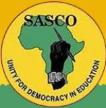SASCO commends UKZN on making IsiZulu compulsory
17 May 2013
The South African Students Congress (SASCO) commends the University of KwaZulu Natal (UKZN) on amending their language policy to make isiZulu a compulsory course for all first year students at UKZN from next year onwards regardless of the degree they are enrolled for. We believe that in a country where multilingualism is enshrined in the constitution, this is a great initiative undertaken by the University towards implementing multilingualism in the post-schooling sector and the intellectualisation of indigenous African languages.
As it stands, IsiZulu is the most spoken language in South Africa with a little over 23% of the population having IsiZulu as a home language, followed by IsiXhosa at 17. %, which is followed by Afrikaans at 13.%. English, although used as the medium of instruction at institutions of higher education and further training, is only used by little over 8% of the total population as a home language. This means that in order for any individual to be able to function in the South African linguistic context, they must have basic communication skills in at least one African language.
We applaud the efforts of the Ministry of Higher Education and Training in advocating for the promotion of African Languages in institutions of higher learning and further training. We note the remarks of Dr. Blade Nzimande, the Minister of Higher Education and Training, that "the development of African languages is not just nice to have but is a necessity for human rights and dignity as well as for access to university and tertiary success". We agree with the Minister Nzimande that tertiary students should at least have learnt one African language before they complete their studies.
In a multilingual society such as ours, there is a need for proper and intensive language planning so that all languages are accommodated and no language is prejudiced or marginalized. African languages should be used as languages of teaching and learning in our institutions of higher education. Although the Language policy on Higher Education (2002) requires South African universities to implement multilingualism in their teaching and learning programmes, language policies from different institution of higher learning shows no commitment to such. Language policies of various institutions emphasise multilingualism but there little practical commitment to implement such policies.
We therefore call on the Department of Higher Education and Training to put in place stringent measures for the monitoring and evaluation of the language policies of institutions of higher learning. We call also upon other institutions of higher learning to follow the example set by the UKZN and implement policies towards the compulsory teaching and learning of indigenous African languages across the board and for specific courses as is done at the University of Cape Town, Rhodes University, University of Stellenbosch, University of Pretoria, University of the Free State etc for students enrolled for medicine/pharmacy and other courses.
Multilingualism in higher education can only be achieved through the willingness of institutions of higher learning and students to make African Languages part of the post-school educational experience. Multilingual programmes such as the one initiated by UKZN, while progressive, they are just a drop in an ocean. We believe that mother tongue education should be offered as a linguistic right to anyone who wants to learn in any official language; however this can only happen if the project of mother tongue education is taken up at the primary and secondary schooling levels.
Statement issued by Ngoako Selamolela, SASCO President, and Themba Masondo, SASCO Secretary General, May 17 2013
Click here to sign up to receive our free daily headline email newsletter

